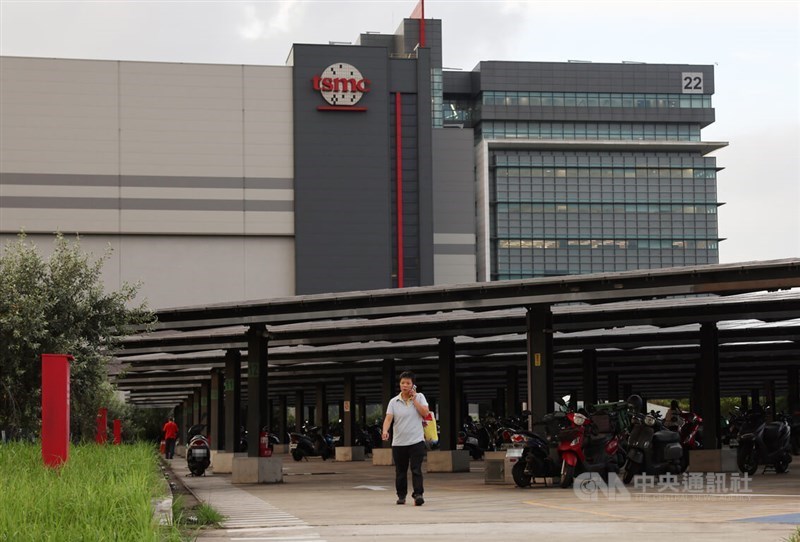
Washington, Sept. 29 (CNA) Washington's idea of a "50-50" split in semiconductor production between Taiwan and the United States is "highly unlikely" to be achieved within the next three years, tech experts said Monday.
Stephen Ezell, vice president for global innovation policy at the Information Technology and Innovation Foundation, told CNA that Taiwan makes 5.7 million wafers per month and the U.S. only made 1.12 million in 2022, meaning the 50-50 goal is unlikely by the end of President Donald Trump's term in 2028.
With the Chips Act in effect, the U.S. is "poised to increase its global share of semiconductor capacity from 10 percent in 2022 to possibly as much as 20 percent by the end of this decade," which is close to 3.4 million per month, Ezell said.
But "even that would be less than where Taiwan stands today," he noted.
On Sunday, U.S. Commerce Secretary Howard Lutnick told U.S. media that the 50-50 split has been proposed to Taiwan and was central to the Trump administration's strategy.
"So the idea that I pitched them [Taiwan] was, let's get to 50-50. We're producing half, and you're producing half," Lutnick said in an interview.
"Now you can imagine when someone has 95 percent convincing them that they should only have 50 percent, that's a lot of talking, but you can tell...I'm not really shy about talking."
It was not exactly clear if the production Lutnick was referring to was Taiwan's overall production or just that geared toward the U.S. market.
In the same interview, he said: "When I walked into this department, the United States of America had 2 percent of the market. We were producing 2 percent of the chips we need. And my objective when I leave is 40 percent," he said, before then suggesting 50 percent.
In response to Taiwan's concerns that the split would weaken Taiwan's "silicon shield," Lutnick said ample U.S. chip supply was necessary to protect Taiwan.
Ezell agreed with Lutnick that the U.S. needed a "robust and diverse capacity in semiconductor manufacturing," since "virtually every high tech industry... depends on semiconductors as a critical input."
If Taiwan's supply were disrupted in the event of a conflict in the region, the U.S. would need a robust capability to continue supporting fighting operations, making chip production capacity necessary for the national security of the U.S. and defense of like-minded nations, he said.
This was the goal of the Chips Act, which was prompted by the global chip distribution disruption during the COVID-19 pandemic, Ezell said.
The event awakened U.S. policy makers to the importance of sufficient domestic chip supply for its economic and security interests, he said.
Regarding the "silicon shield" concept, which sees Taiwan's concentrated and irreplaceable chip production as a reason for the global community to maintain peace in the Taiwan Strait, Ezell said it was "legitimate."
For Taiwan, the "critical point" of the concept is being able to withstand economic and geopolitical pressure from China.
Taiwan "must foremost have a robust, high functioning, high value-added economy, and semiconductor industry" for the broader economic wealth to support its military and national security, he said.
Meanwhile, Derek Scissors, a senior fellow at the Washington-based American Enterprise Institute who focuses on the Chinese and Indian economies and on U.S. economic relations with Asia, said "Lutnick's stated goals cannot be achieved during President Trump's second term."
In an email responding to a CNA query, Scissors said the U.S. could move faster toward self-reliance if it "focused on one kind of chip first," such as three-nanometer chips, and then turn to less advanced chips later on.
-
Society
Yushan sees snowfall as wetter weather hits Taiwan: CWA
02/28/2026 01:00 PM -
Society
Taiwan headline news
02/28/2026 11:02 AM -
Politics
Archives show 228 violence extended beyond Taipei: Researcher
02/28/2026 10:50 AM -
Politics
To some, transitional justice has yet to expunge ghosts of 228 Incident
02/28/2026 09:49 AM -
Sports
Taiwan men's épée team wins first-ever gold at Asian junior fencing tourney
02/27/2026 09:39 PM